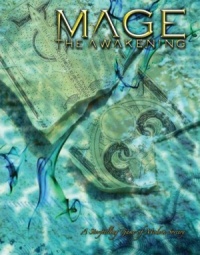
| Attainment 2 requires Gnosis 5, Attainment 3 requires Gnosis 7 like every other Legacy.
|
Though woe and worry may weigh down your soul like lead, by the heat of your own efforts may you yet shine like gold.
Since the dawn of civilization, mankind has dreamed of creating wealth from worthless matter. Such a dream can be made real, mankind found, but only through hard work and a bit of luck. A lump of stone or wood can, through carving, grinding or knapping, be made into an object that is useful, beautiful or both. Patience and toil can be applied
to a patch of dirt to cause crops to spring up or livestock to increase and grow strong. Those willing to sacrifice their time and effort in this way often seem to feel that basing their lifestyle on such activity yields not only material wealth but also en- dows the soul with extended qualities of utility and beauty.
Not everyone was willing to put forth such effort, though, so some devised shortcuts to wealth, claiming credit for the work of others or even claiming the product of that work for themselves. They divorced the notion of “wealth” from the material benefits of work, reducing riches to a system of artificial value placed upon rare metals or gems (and later to printed scraps of paper and then to glowing numbers on a monitor screen). The actual work of enriching life was denigrated as a lowly occupation and the soulcraft it engendered dismissed as fantasy by those unwilling to engage in it.
Getting something for nothing only leaves one wanting more. Empty wealth, like food without nutrients, can be addictive, expanding the vacuum it was intended to fulfill. Into such a vacuous society there inevitably resurfaced distorted legends that told of how the mages of old learned the secret of tuning lead into gold, dirt into money, shit into Shinola. With the legends came charlatans, those who claimed to know the trick of getting something for nothing, who were sought out by kings with vacuous coffers, who fleeced their patrons by wrapping their lead ingots in polished brass foil and slipped out of the palace by night with their own empty wealth jingling in their purses. So the legends fell into disrepute (but without ever disappearing entirely) while the quest for empty wealth continued.
The truth behind those legends would shock the royal addicts who heard them. Indeed, the mages of Atlantis had learned the “trick” of transmuting one substance into another, but it was only an incidental side effect of their real work. Their labors were not ultimately directed toward the external material world, but inward. Like land, wood or stone, the human soul can be cultivated and shaped, they found, transformed into something both greater and finer than what it might otherwise be. The “lead” that they operated upon was themselves, and the “gold” that they created was themselves.
This is not to say that their “alchemy” was a purely contemplative practice, a type of meditation cloaked in a physical metaphor. The image of the secluded chamber with its kiln and clutter of alembic, retort and crucible is factually accurate. Experimentation in the material plane was as much a part of their practice as spiritual discipline. Engaging in a physical craft with an appropriate mindset of self-observation can synchronize changes in both the inner and outer worlds. This Legacy teaches that true understanding is best reached by mirroring the inner process with the outer.
Just as matter can be shaped by heat and cold, by hammer’s blow and chisel’s cut, so too can the soul be shaped by pleasure and pain, by feeling and thought. Emotional baggage or faulty modes of thought can be trimmed away and desirable qualities such as honesty and compassion may be added to the alloy mixture in the crucible of the soul. Imperfection can be burned off, boiled out or frozen and chipped away. The soul’s purest essence may be distilled out of the woes and trauma that weigh it down, leaving it free to become that which is rarer and more precious than gold — the fulfilling life of the complete person.
Inheritors of this Legacy are known as the “Uncrowned Kings,” a term that most outsiders take to refer to the age of the charlatans, when the rulers of the world could be led by their vacuous desires and anyone who knew those desires could easily become a true “power behind the throne.” But a more esoteric meaning is hidden in the name. Having perfected the technique of crafting their own souls, the Uncrowned could truly claim to be “self-made men,” masters of their own souls. Their “royalty” is based, not upon primogeniture or the hoarding of hollow wealth, but upon the noble qualities that they have cultivated within themselves. They do not rule over nations, but over themselves to a degree that “common” folk can scarcely imagine.
The qualifier “Uncrowned” is equally significant on an esoteric level, beyond the fact that they do not openly display their unique nobility. The adornment of precious metals and gems is at once a metaphoric image connoting inner nobility and personal power, a reference to the physical transmutations that this Legacy practices. The title is also an oblique suggestion of the halo found in religious iconography denoting a brilliance or radiance of consciousness so bright that it shines directly through the skull (normally visible to those with aura perception but sometimes accessible to Sleepers in a religious context). But these Kings are emphatically Uncrowned, eschewing not only the lauds of their peers, but also the empty wealth that they are capable of creating
Attainments
